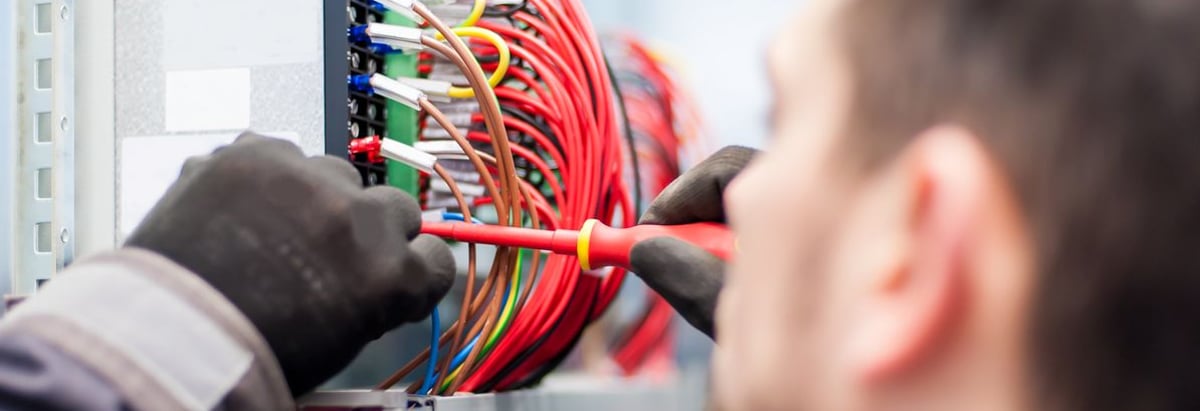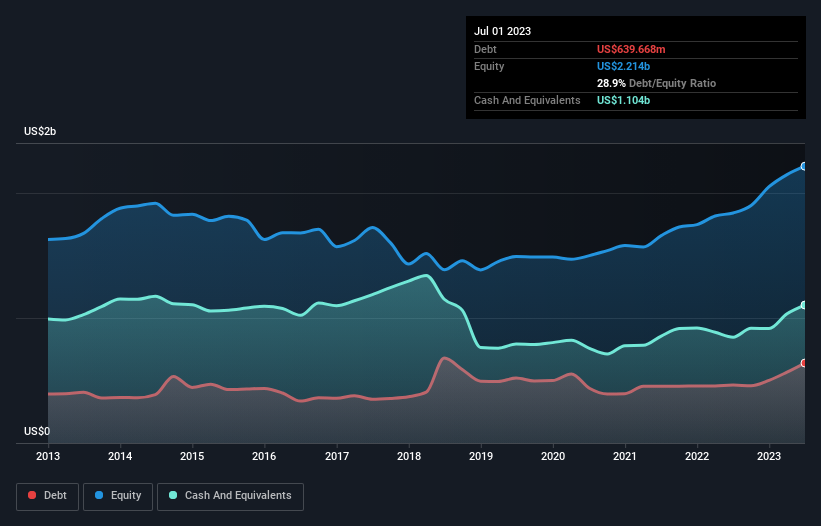Vishay Intertechnology (NYSE:VSH) Has A Pretty Healthy Balance Sheet

Some say volatility, rather than debt, is the best way to think about risk as an investor, but Warren Buffett famously said that 'Volatility is far from synonymous with risk.' It's only natural to consider a company's balance sheet when you examine how risky it is, since debt is often involved when a business collapses. We can see that Vishay Intertechnology, Inc. (NYSE:VSH) does use debt in its business. But should shareholders be worried about its use of debt?
When Is Debt A Problem?
Debt and other liabilities become risky for a business when it cannot easily fulfill those obligations, either with free cash flow or by raising capital at an attractive price. Ultimately, if the company can't fulfill its legal obligations to repay debt, shareholders could walk away with nothing. However, a more frequent (but still costly) occurrence is where a company must issue shares at bargain-basement prices, permanently diluting shareholders, just to shore up its balance sheet. Of course, the upside of debt is that it often represents cheap capital, especially when it replaces dilution in a company with the ability to reinvest at high rates of return. The first thing to do when considering how much debt a business uses is to look at its cash and debt together.
Check out our latest analysis for Vishay Intertechnology
What Is Vishay Intertechnology's Net Debt?
You can click the graphic below for the historical numbers, but it shows that as of July 2023 Vishay Intertechnology had US$639.7m of debt, an increase on US$463.3m, over one year. However, its balance sheet shows it holds US$1.10b in cash, so it actually has US$464.1m net cash.

How Strong Is Vishay Intertechnology's Balance Sheet?
We can see from the most recent balance sheet that Vishay Intertechnology had liabilities of US$758.4m falling due within a year, and liabilities of US$1.21b due beyond that. Offsetting this, it had US$1.10b in cash and US$453.3m in receivables that were due within 12 months. So its liabilities total US$416.0m more than the combination of its cash and short-term receivables.
Since publicly traded Vishay Intertechnology shares are worth a total of US$3.28b, it seems unlikely that this level of liabilities would be a major threat. But there are sufficient liabilities that we would certainly recommend shareholders continue to monitor the balance sheet, going forward. While it does have liabilities worth noting, Vishay Intertechnology also has more cash than debt, so we're pretty confident it can manage its debt safely.
Also good is that Vishay Intertechnology grew its EBIT at 12% over the last year, further increasing its ability to manage debt. There's no doubt that we learn most about debt from the balance sheet. But ultimately the future profitability of the business will decide if Vishay Intertechnology can strengthen its balance sheet over time. So if you're focused on the future you can check out this free report showing analyst profit forecasts.
Finally, while the tax-man may adore accounting profits, lenders only accept cold hard cash. While Vishay Intertechnology has net cash on its balance sheet, it's still worth taking a look at its ability to convert earnings before interest and tax (EBIT) to free cash flow, to help us understand how quickly it is building (or eroding) that cash balance. In the last three years, Vishay Intertechnology's free cash flow amounted to 43% of its EBIT, less than we'd expect. That's not great, when it comes to paying down debt.
Summing Up
Although Vishay Intertechnology's balance sheet isn't particularly strong, due to the total liabilities, it is clearly positive to see that it has net cash of US$464.1m. And it also grew its EBIT by 12% over the last year. So we are not troubled with Vishay Intertechnology's debt use. When analysing debt levels, the balance sheet is the obvious place to start. But ultimately, every company can contain risks that exist outside of the balance sheet. We've identified 1 warning sign with Vishay Intertechnology , and understanding them should be part of your investment process.
At the end of the day, it's often better to focus on companies that are free from net debt. You can access our special list of such companies (all with a track record of profit growth). It's free.
New: Manage All Your Stock Portfolios in One Place
We've created the ultimate portfolio companion for stock investors, and it's free.
• Connect an unlimited number of Portfolios and see your total in one currency
• Be alerted to new Warning Signs or Risks via email or mobile
• Track the Fair Value of your stocks
Have feedback on this article? Concerned about the content? Get in touch with us directly. Alternatively, email editorial-team (at) simplywallst.com.
This article by Simply Wall St is general in nature. We provide commentary based on historical data and analyst forecasts only using an unbiased methodology and our articles are not intended to be financial advice. It does not constitute a recommendation to buy or sell any stock, and does not take account of your objectives, or your financial situation. We aim to bring you long-term focused analysis driven by fundamental data. Note that our analysis may not factor in the latest price-sensitive company announcements or qualitative material. Simply Wall St has no position in any stocks mentioned.
About NYSE:VSH
Vishay Intertechnology
Manufactures and sells discrete semiconductors and passive electronic components in the United States, Germany, rest of Europe, Israel, and Asia.
Adequate balance sheet and fair value.
Similar Companies
Market Insights
Community Narratives





